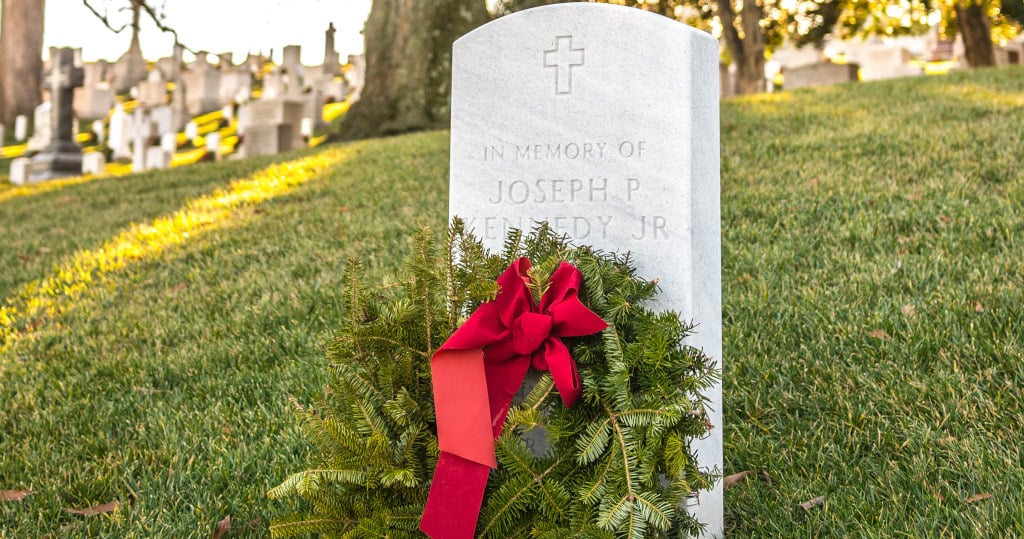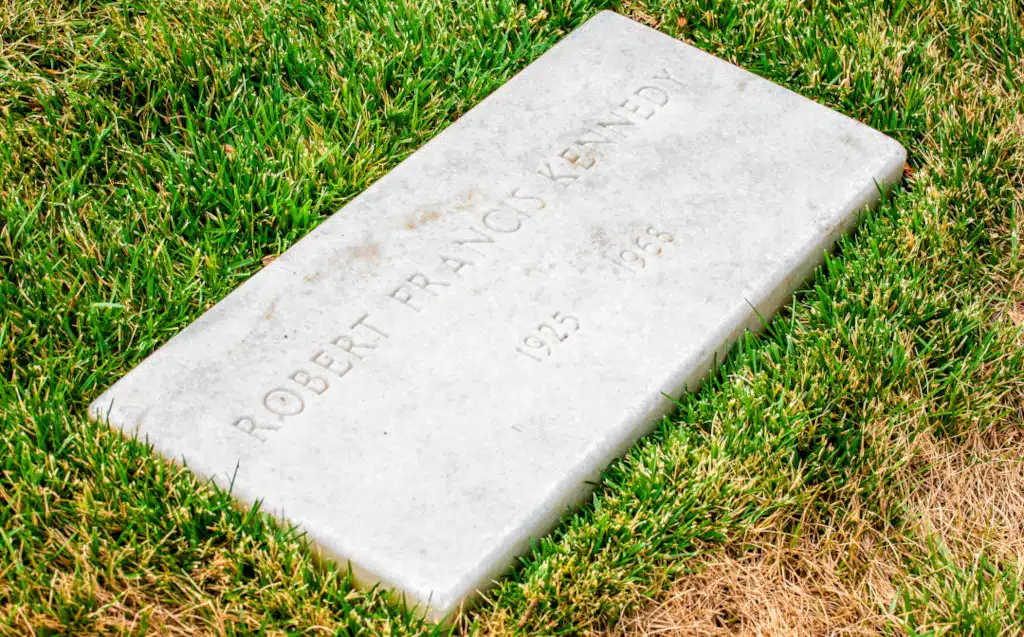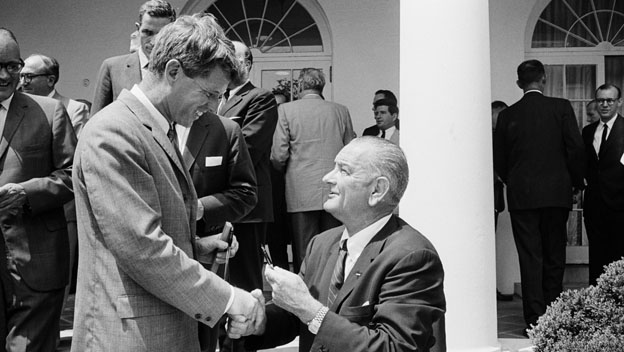The question, "Why was Robert Kennedy buried at night?", often sparks a moment of quiet reflection for many people, and it's a very good question, truly. It points to a unique and rather somber chapter in American history, a time when the nation was grappling with an immense loss, yet again. That a prominent figure like Robert F. Kennedy, known to so many, would be laid to rest under the cover of darkness certainly raises curiosity, and understandably so. It's a detail that stands out, a bit unusual, and it makes you wonder about the circumstances surrounding such a deeply personal, yet very public, moment of grief.
When we ask "why" about something, we're really trying to get at the heart of the matter, aren't we? We want to know the cause, the reason, or the actual purpose behind an event. For what reason did this happen? That's what we're looking for. In informal conversations, we might just say, "why's that?", hoping for a quick explanation. With Robert Kennedy's burial, the reasons are, in some respects, quite complex, weaving together practical challenges, the family's wishes, and the overwhelming emotion of a grieving country.
This article will explore the various factors that led to that late-night burial in Arlington National Cemetery. We'll look at the immediate aftermath of his tragic passing, the logistical hurdles that arose, and the deeply personal desire for a measure of peace during an incredibly difficult time. It’s a story that reveals a lot about a family, a nation, and the very human need for solace, even in the glare of the world's attention, so it's a very interesting topic.
- Juice Wrld Smile Hoodie
- Tornado Warning Issued For Branch County Thunderstorm
- Get In My Belly
- Thank You In Hebrew
- Ian Anderson Jethro Tull
Table of Contents
- Robert F. Kennedy: A Brief Life Story
- The Shocking Loss and Immediate Aftermath
- Logistical Hurdles and Practicalities
- Respect, Privacy, and Public Emotion
- Historical Context and Precedent
- More Than Just a Burial: A Symbolic Farewell
- Frequently Asked Questions About RFK's Burial
Robert F. Kennedy: A Brief Life Story
Robert Francis Kennedy, often called "Bobby," was born into one of America's most prominent political families, that's true. He was a younger brother to President John F. Kennedy, and he carved out his own path in public service. He served as Attorney General during his brother's presidency, playing a pretty important part in the administration's efforts, especially in civil rights matters, so he was quite involved.
After his brother's passing, he became a U.S. Senator representing New York, and he continued to advocate for social justice, poverty reduction, and racial equality. His political career was marked by a strong commitment to the disadvantaged and a desire to heal divisions within the country. He ran for president in 1968, capturing the hopes of many Americans, but his campaign was tragically cut short, a very sad event, actually.
Personal Details and Bio Data
| Full Name | Robert Francis Kennedy |
| Nickname | Bobby |
| Born | November 20, 1925 |
| Died | June 6, 1968 |
| Place of Birth | Brookline, Massachusetts, USA |
| Spouse | Ethel Skakel Kennedy |
| Children | 11 (Kathleen, Joseph, Robert Jr., David, Courtney, Michael, Kerry, Christopher, Max, Douglas, Rory) |
| Education | Harvard University, University of Virginia School of Law |
| Political Party | Democratic |
| Notable Roles | U.S. Attorney General, U.S. Senator from New York |
The Shocking Loss and Immediate Aftermath
On June 5, 1968, just after winning the California presidential primary, Robert Kennedy was shot in Los Angeles. The news sent shockwaves across the United States, and truly, the entire world. It was a moment of profound disbelief, as the nation had only recently endured the assassination of his brother, President John F. Kennedy, less than five years earlier. The sense of déjà vu, of history repeating itself in such a cruel way, was absolutely devastating for so many people, you know.
- Body Pole Nyc
- Winn Army Community Hospital
- Brennans On The Bayou
- Hotel Glance In Florence Firenze
- Honolulu Board Of Water Supply
Robert Kennedy passed away early on June 6. The immediate aftermath was chaotic, with a grieving family and a nation plunged into mourning. There was an outpouring of sorrow, a very palpable sense of loss that spread from coast to coast. People gathered spontaneously, trying to make sense of what had happened, and that, in a way, set the stage for the unusual circumstances of his final farewell.
Logistical Hurdles and Practicalities
One of the primary reasons for the late-night burial was, in fact, purely practical. The funeral services began in New York City, and the plan was to transport Robert Kennedy's body by train to Washington D.C. for burial at Arlington National Cemetery. However, this train journey became an unforeseen challenge, a very slow and emotional procession, actually.
Thousands upon thousands of people, quite literally, lined the tracks along the entire route, from New York to Washington. They stood silently, or waved flags, or just watched, wanting to pay their respects to a man they admired, a man they felt had given them hope. This incredible turnout, while deeply moving, caused significant delays. The train had to move at a very slow pace, sometimes stopping completely, to ensure the safety of the crowds and to allow people a moment to honor him. So, it was a very long trip, indeed.
The Journey to Arlington
The funeral train, which had left New York in the early afternoon, arrived in Washington D.C. much, much later than originally planned. It was already dark, very dark, by the time the train pulled into the station. The sheer number of mourners who had gathered along the tracks meant that what should have been a relatively quick journey turned into an hours-long vigil. This unexpected delay pushed the entire schedule back considerably, almost to the point where a daytime burial simply wasn't possible anymore, you know.
The procession from the station to Arlington National Cemetery also faced challenges. Roads were crowded, and the atmosphere was thick with emotion. Moving such a significant motorcade through the capital, even late in the day, required careful coordination and was still subject to delays caused by the sheer volume of people who wished to be present, even if just to stand by the roadside. The time just kept ticking away, and the sun had definitely set, pretty much completely.
Preparing the Resting Place
Arlington National Cemetery, a place of honor and solemnity, needed to be prepared for the burial. Even though the grave site was near his brother's, there were still arrangements to be made, and this takes time, of course. With the funeral train running so far behind schedule, the cemetery staff and military personnel involved had to work into the night to ensure everything was ready for the arrival of the casket. This included lighting the area, which isn't typically needed for a daytime ceremony, so that was a bit different.
The decision to proceed that night, rather than postponing until the next day, was also influenced by the desire to bring closure to a very long and emotionally draining day for the family and for everyone involved. There was a sense of wanting to complete the difficult task, to lay him to rest, and allow the family a moment of peace after such a prolonged period of public mourning and travel, you know, it was just very taxing.
Respect, Privacy, and Public Emotion
Beyond the practicalities, there was a profound desire for privacy, a very human need for the family. The Kennedy family had already endured immense public scrutiny and grief with the assassination of President Kennedy. With Robert's passing, the emotional toll was, in a way, even more immediate and raw. A daytime burial would have drawn an even larger crowd, creating an almost impossible situation for the family to grieve in a personal way, you know, it would have been overwhelming.
The night burial offered a shield, a measure of quiet dignity that would have been impossible during daylight hours. It allowed the family and closest friends a more intimate moment to say their final goodbyes, away from the intense glare of cameras and the overwhelming presence of the public. This desire for a private farewell, even amidst such a public tragedy, was a very significant factor, truly.
A Family's Wish for Solace
The Kennedy family, understandably, wanted to conduct the burial with as much personal space as possible. They had already shared their grief with the entire nation, from the moment of the shooting through the funeral services in New York. The journey to Arlington was a final, very difficult passage. Burying him at night provided a measure of solace, a chance for them to grieve without the added pressure of managing massive crowds or performing for the cameras. It was, in some respects, their last chance for a truly personal goodbye, a bit of peace, you know.
This decision reflected a deep need for quiet and respect for the deceased and his loved ones. It allowed for a more solemn and dignified ceremony, one that focused on the personal grief of the family rather than the public spectacle. The darkness, in a way, offered a comforting embrace, allowing tears to fall unseen and private words to be exchanged, very quietly, indeed.
Managing a Nation's Grief
The public's grief was immense, very intense, and truly widespread. People felt a personal connection to Robert Kennedy and his family. Managing the crowds, ensuring safety, and maintaining order during a daytime burial would have been an enormous undertaking, almost impossible, some might say. The night burial helped to mitigate some of these challenges, reducing the sheer number of people who would have tried to access the cemetery or line the roads leading to it, so that was a factor.
While many still gathered outside the cemetery gates, the darkness naturally limited the visibility and the overall scale of the public gathering at the immediate burial site. This allowed for a more controlled environment, ensuring that the ceremony itself could proceed without interruption or overwhelming public presence. It was, basically, a way to balance the public's desire to mourn with the practical need for order and the family's wish for a quiet farewell, you know.
Historical Context and Precedent
It's also worth remembering the historical context of the time. The nation was already reeling from a series of shocking events: the assassination of President Kennedy, the ongoing Vietnam War, and the civil rights movement, which had seen its own share of violence, including the assassination of Martin Luther King Jr. just months before. The country was in a very fragile state, emotionally speaking, so it was a very tense period.
The decision to bury Robert Kennedy at night, while unusual, can also be seen as a reflection of the extraordinary circumstances of the time. It wasn't a typical funeral, because nothing about his death or the national mood was typical. It was a time of deep national trauma, and the burial, in a way, mirrored that darkness and solemnity. It was a very unique moment in history, truly.
Echoes of a Brother's Passing
The memory of John F. Kennedy's assassination and subsequent funeral was still very fresh in everyone's minds, very much so. The public outpouring of grief for JFK had been unprecedented, drawing massive crowds and creating an atmosphere of overwhelming public emotion. The family, and those responsible for the arrangements, were keenly aware of this precedent. They knew that Robert Kennedy's funeral would likely evoke a similar, if not greater, surge of public sorrow and attendance, so they were prepared for that, in a way.
The night burial, therefore, might have been a deliberate choice, or at least a practical necessity, to avoid a repeat of the overwhelming crowds and potential chaos seen at JFK's funeral. It was a way to manage the public's desire to participate in the mourning while also protecting the family's need for a private moment of farewell. It was, in some respects, a lesson learned from a previous, very painful experience, you know.
More Than Just a Burial: A Symbolic Farewell
The night burial of Robert Kennedy became more than just a logistical outcome; it took on a symbolic meaning, truly. It represented the profound sadness and the sense of a light extinguished too soon. The darkness of the night seemed to perfectly match the darkness of the nation's mood, a very somber reflection. It was a quiet, dignified end to a life that had been lived so publicly and with such passion, so it felt fitting, in a way.
Even today, decades later, the image of that late-night procession and burial remains etched in the collective memory. It's a powerful reminder of a turbulent era, a time of both hope and profound loss. The question "Why was Robert Kennedy buried at night?" continues to prompt us to reflect on the complex interplay of personal grief, public emotion, and the practicalities that shape historical moments, and it really makes you think, doesn't it? Learn more about American history on our site, and link to this page for more insights into the Kennedy family's legacy. You can also find out more about Arlington National Cemetery's history at their official site, a truly fascinating place to visit, you know, Arlington National Cemetery.
Frequently Asked Questions About RFK's Burial
People often have questions about this particular event, and that's perfectly natural, you know. Here are a few common ones:
Where is Robert Kennedy buried?
Robert Kennedy is buried at Arlington National Cemetery, in Arlington, Virginia. His grave is located very near to his brother, President John F. Kennedy, in a section that has become a site of pilgrimage for many people, so it's a very significant spot.
Who attended Robert Kennedy's funeral?
Robert Kennedy's funeral was attended by his immediate family, including his wife Ethel and his children, as well as numerous political figures, friends, and dignitaries from around the world. The public also lined the streets and the train route in vast numbers, showing their respects, so it was a very widely attended event, in a way.
How long after his death was RFK buried?
Robert Kennedy passed away in the early morning hours of June 6, 1968, and he was buried just after midnight on June 8, 1968. So, his burial took place about two days after his passing, which included the lengthy funeral train journey from New York to Washington D.C., a very long process, indeed.
- Hilton Cincinnati Netherland Plaza
- The Grill On The Alley
- Ian Anderson Jethro Tull
- Ventura County Credit Union
- I Accidentally Stole The Bad Boys Kiss



Detail Author:
- Name : Jaida Stroman
- Username : norval14
- Email : queenie.eichmann@gmail.com
- Birthdate : 2002-09-20
- Address : 895 Senger Flat Port Emeryshire, ME 47501-2014
- Phone : +15674817146
- Company : Bruen-Cronin
- Job : Photographic Restorer
- Bio : Et et tempora animi. Optio deleniti labore cum et. Eaque est facere fuga qui aut. Enim rem assumenda in veniam impedit debitis. A quo autem sunt qui.
Socials
tiktok:
- url : https://tiktok.com/@josh.douglas
- username : josh.douglas
- bio : Accusamus velit saepe aut id repellendus rerum.
- followers : 3188
- following : 2212
facebook:
- url : https://facebook.com/joshdouglas
- username : joshdouglas
- bio : Aut nihil quisquam veniam est ut.
- followers : 4686
- following : 160
instagram:
- url : https://instagram.com/jdouglas
- username : jdouglas
- bio : Numquam nisi sed velit aut explicabo rerum. Quia eum necessitatibus atque quia maxime magni quia.
- followers : 1755
- following : 1767
linkedin:
- url : https://linkedin.com/in/douglas1971
- username : douglas1971
- bio : Fuga temporibus est delectus.
- followers : 1448
- following : 1274
twitter:
- url : https://twitter.com/josh_douglas
- username : josh_douglas
- bio : Vero vel maxime eius repudiandae tenetur. Iure quisquam voluptas commodi et quibusdam. Maxime nemo dolor officia consequatur ipsa minima optio dolores.
- followers : 840
- following : 2614

